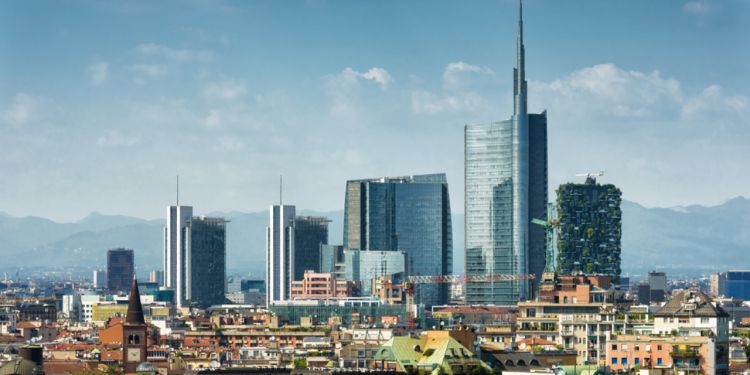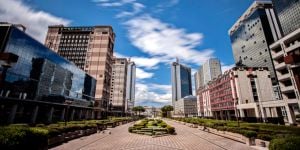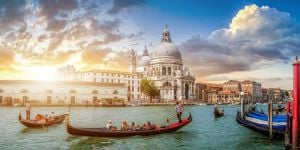
Milan has always been the economic capital of Italy. Renowned for its fashion, design and service industries, particularly banking and finance, it has weathered the global crisis by remaining one of Europe's leading financial and commercial centers. Milan continues investing heavily in finance and consulting and pioneering new sectors such as biotechnology and pharmaceuticals.
Milan is also a city of culture and art that will surprise you with the quantity and quality of its museums and events. In this article, we will try to give you some tips on how to start your job search as an expat in Milan.
Good to know:
Milan offers some of the highest salaries in the country, which is reflected in the cost of living, which is also relatively high compared to other Italian cities such as Turin, Florence, or Rome. You can obtain additional information about the cost of living in Milan in real time on the Numbeo website.
The job market in Milan
Today, Lombardy, the northern region of Italy, accounts for one-fifth of the country's GDP, and Milan alone accounts for 10% of this. The city has the largest number of companies, almost 390,000 (source: Assolombarda 2022) and non-governmental organizations in the country, employing some 1.6 million people. The pharmaceutical and life sciences, chemical, manufacturing, media and service sectors are the most successful in Milan. The banking and insurance sector is the lifeblood of the city. Unemployment stands at 6.5% (ISTAT 2022) of the metropolis's population, although the employment rate of 68.3% in Lombardy has almost reached the level of the pre-Covid era. Today, after the pandemic, the most productive professional categories are in the pharmaceutical, technology (leading the recovery), IT and digital marketing sectors, as well as in services offered by professionals such as engineers, researchers and teachers.
The most prominent fields in Milan
Banking
Milan is known as the economic capital of Italy. It is home to many international and national companies, including major brands such as Alfa Romeo, Pirelli and Campari Group. The city places great importance on the banking and financial sector and is home to all of the world's leading service companies, such as Microsoft, Google, Blackrock, Deloitte and JP Morgan. In addition, the city hosts the Italian offices of the world's leading rating agencies, such as Standard and Poor's, Moody's and Fitch Ratings. These companies regularly offer positions to expatriates.
Fashion and design
Milan is famous for its fashion and design sector, as evidenced by the headquarters of Versace, Armani, Luxottica, Valentino and Prada, as well as for its Foundation, which hosts contemporary art exhibitions. If you have the skills to work in this industry, take a chance. The sector offers interesting job opportunities, not to mention the branches that can arise from it, such as marketing and advertising. However, you should be aware that there is some competition among applicants. Milan is also known for its fashion week, which takes place twice a year. During this period, designers, models and bloggers take to the streets of the city center, the Fashion Quadrilateral, the Galleria Vittorio Emanuele, Brera and also Tortona.
And if you're a design lover, you'll know that Milan hosts the Salone del Mobile Milano every year, which takes place at Milano Fiera but also in the city with the Fuori Salone. The Italian city lives to the rhythm of temporary showrooms, openings and other inaugurations of spaces that present the latest trends in architecture, design and decoration.
Research
Sustainability is an important issue in Milan, and the city has become a key player in environmental and energy issues. Indeed, it is home to some of the largest research and development-oriented companies but also to the best Italian universities focused on scientific and social research, such as the Politecnico, which focuses exclusively on science and technology and trains engineers, architects and designers, and the Università Cattolica del Sacro Cuore, which offers doctorates and post-doctorates in physics, biomedical engineering, social studies, etc.
Start-ups in Milan
Milan has become a leading destination for start-ups, thanks in particular to the 2013 growth decree, which facilitates the creation of innovative companies. In figures, this means that in September 2022, there were almost 2,800 start-ups registered in Milan. Regarding territorial distribution, Lombardy is confirmed as the leading region in Italy, where more than 26.7% (about 3,900 companies) of all Italian start-ups reside and which mainly recruit young people. There is a climate of innovation and avant-garde in the city of Milan. Check the Italian Chamber of Commerce business register for Italian for Milan-based start-ups. This can be interesting if you are a young graduate looking for work experience.
Languages and education in Italy
As an expat in Italy, it is important to know the language of your host country, especially if you want to work there. To learn or improve your language skills, look into public schools that offer modules such as conversation, immersion, etc. Alternatively, enroll in the courses offered by the Comune di Milano, which are available in almost every district.
Languages such as English and French are also important assets. This is a promising area if you are a language teacher! So if you want to teach English as a foreign language, start by looking for jobs with TEFL Italy and check out ESL Base-Italy for a full list of language schools in Milan. The British Council also offers the opportunity to move to Milan with its language assistance programs. Finally, some of the more remote primary schools and schools in the city, such as Language Leader and World Bridge, are looking for teachers.
Events and jobs in Milan
As mentioned above, Milan continually hosts a large number of events that generate a lot of jobs, from the exhibition center with Milano Fiera, to events such as Design Week and Fashion Week, to the upcoming Milan-Cortina Olympic Games in 2026 in Italy. These short-term projects are a good opportunity to meet key people and develop your professional network in Milan.
Apart from these events and the traditional employment sectors, it is also possible to find part-time jobs in Milan, such as childcare, sports or hospitality jobs, retail and customer service. As Milan is a dynamic city, many bars and restaurants are also looking for experienced waiters to work during the day and/or evening.
Milan is undoubtedly the epicenter of the "Made in Italy" concept. It is both the showcase of Italy abroad and a city eager for evolution, novelty and innovation. It ranks first in Italy in terms of wealth, the standard of living, business and employment. Thanks to its international companies, its many SMEs, and its start-ups, especially in the renewable energy sector, and its propensity for networking, Milan offers good job opportunities.
How to find a job in Milan?
If you're planning to live and work in Milan, we advise you to start your job search before you move to Italy. LinkedIn is a good place to start looking for jobs in Milan, but also check out popular websites such as Indeed, Monster, Glassdoor, Infojobs, Lavorare.net, and Clicca Lavoro. Don't forget Milan-specific job boards such as Jobsinmilan, The Local and Corriere della Sera.
In addition, all Italian universities have their own list of job opportunities in collaboration with local companies. These offers are for students only and include a wide range of internships. Alternatively, you can find 'non-curricular' internships, which are the most important first step in starting a career.
Alternatively, you can register with a recruitment agency, such as Gi Group, Randstad, or Adecco. These agencies also offer job opportunities and internships organized by them in the field of human resources.
EURES - European Employment Mobility Portal is another useful search tool for information on job vacancies, market overviews and working conditions in Italy.
Having said that, everyone will tell you that networking is a great way to find a job in Italy. Indeed, it is said that 70% of jobs are found through networking. French and English-speaking networking groups are an excellent starting point to turn sometimes simple contacts into new collaborators. For example, the American Business Group in Milan or Eventbrite can help you find networking events that can help you meet the right people. Don't forget Expat.com's Milan forum or its jobs section.
Important:
Some fraudulent advertisements are recognizable, as they are usually published anonymously and do not indicate the type of work offered. Log on to the website of the Italian tax agency, Agenzia delle Entrate, or the Camera di Commercio, to verify the existence of a company.
Good to know:
Expatriates wishing to work and live in Milan must present a valid passport and obtain a Permesso di Lavoro (for more information, see our article "Long-stay visas for Italy").
If you are a citizen of an EU country, you will not need a work visa but a certificate of residence in Italy.
If you have difficulties finding a job, register with the Centro per l'impiego AFOL (your local employment center).
CV and cover letter in Milan
In order to apply for a job in Milan as an expat, you will need to provide a CV and a cover letter - lettera di presentazione - in Italian. The latter is sometimes indicated as optional in job advertisements, but it is advisable to provide one as it is generally appreciated in Italy. Explain why you are interested in the job and the company and what you can bring to it as an employee. Emphasize your experience, the languages you speak, and what makes you different from other potential candidates. Some international companies sometimes ask for it in English.
The application, whether spontaneous or not, is usually made on the Internet by e-mail or via the website that published the advertisement. If a potential employer is interested in your profile, he or she will contact you by phone and offer you an interview at the company or at the recruitment agency if you have applied via this channel.
Regarding your CV, you can provide it in Europass format, which is generally appreciated in Italy. The date of birth should be indicated at the top of the document. You should also include your contact details, and your nationality, especially if you are from another EU country or a third country, as some multinational companies have specific policies. Then describe your previous work experience, as this information is considered essential. Start with your most recent experience and end with your qualifications and skills.
Ideally, the CV should not exceed two pages. Include the names of two referees and their contact details. Do not hesitate to include a photograph as well; this is usually appreciated.
Good to know:
If you have a good command of the Italian language in addition to your mother tongue, French or English (or even other languages), and a good combination of skills, you will be able to find professional opportunities in Italy, especially with international companies.
Be sure to indicate your level of language proficiency on your CV, especially Italian, according to the Common European Framework of Reference for Languages (CEFR).
Where to live in Milan
Regardless of the duration of your stay in Milan, it is generally advisable to find accommodation in relation to your place of work. However, Milan is a smaller and less chaotic city than Rome. In addition, public transport in Milan is much better than in the Italian capital. However, the property market in Milan is more expensive, so if you work in the city center, we advise you to look for accommodation slightly outside it, firstly because of the cost of accommodation but also for reasons of access, as the center is in a restricted traffic area called Area C. Read our article "Accommodation in Milan" to identify the type of neighborhood that best suits your new professional life.
Useful links:
Centro per l'impiego AFOL - Employment Centre
We do our best to provide accurate and up to date information. However, if you have noticed any inaccuracies in this article, please let us know in the comments section below.








